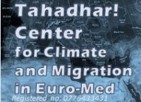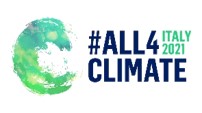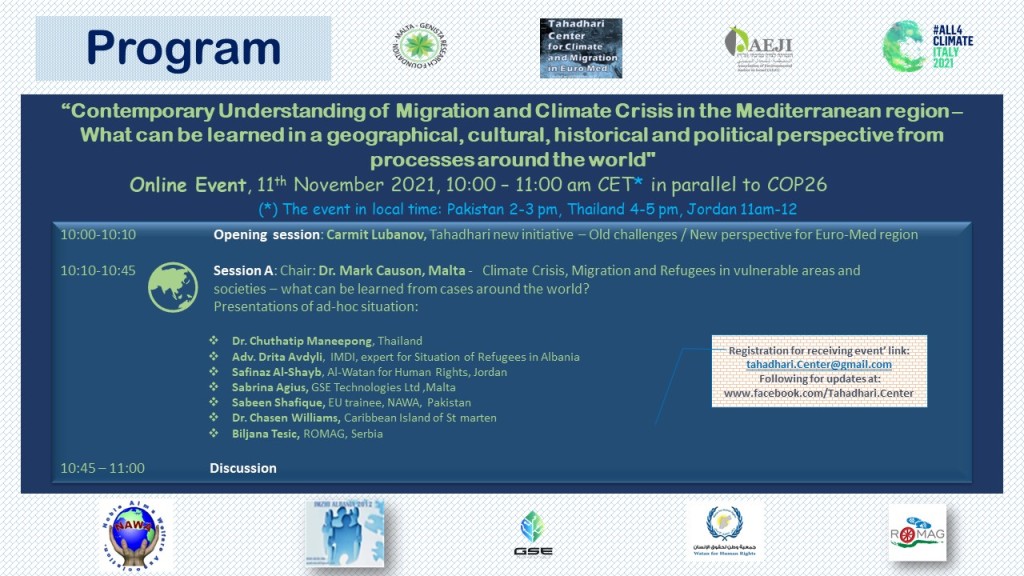
: )
Tahadhari Center was established in 2021, is aimed to be a hotbed for policy research and resources in the field of Climate and Migration in the Euro-Med region.
‘Tahadhari’ in the Swahili language, which is considered the most widely spoken language in the region of the Sahara – countries that are exposed to acute climate crisis followed by forced displacement – means Alert! Watchful! the need to put attention and not anymore ignoring, which exactly defines the Center vision for activities.
Tahadhari Center focuses on developing knowledge on climate-induced migration and works to shape the international climate migration policy, via research, stakeholders’ meetings, working papers, media and more.
The EU’s Green Deal will be one of the strategic frames of the long term activities in vulnerable areas in Southern and Eastern Europe and in Africa – aimed to create a regional climate economy partnership that takes into account the weakest links and energy poverty, so that adaptation programs are not only targeting the environmental objectives but socially, economically, culturally adaptation oriented, aimed to lead to regional climate resilience and regional climate governance that includes a clear reference to cross-continent migration.
Therefore, the two main strategic focuses of Tahadhari centre are in developing and implementing programs, tools and projects in the coordinated and complementary way are:
- In building Climate resilience communities in Euro-Med region in a collaborative work with different stakeholders, that is aimed to advance socio-economic and a gender equality approach to climate-induced migration via research, policy and in implementation with local/regional stakeholders.
- In field projects for Africa vulnerability, targeting climate risks mitigation and adaptation to climate Security, specifically in Lake Chad region.
The modes of activities will be via Think-Tanks with diverse backgrounds and expertise and will be focusing on research, policy, media, education and communication, holding workshops, publications, public events.



SUBSCRIBE TO OUR NEWSLETTER
Contemporary Understanding of Migration and Climate Crisis in the Mediterranean region – What can be learned in a geographical, cultural, historical and political perspective from processes around the world
Climate and Migration around the world – Carmit Lubanov
It is a pleasure for me to open the event today and meet new faces and old colleagues. Thank you all for attending. I will briefly address a number of aspects: The context of today’s discussion is cases in different geographical areas of migration and climate – a human, cultural perspective, to understand from the local conditions what can contribute to us as a group, to joint activity, share knowledge and practices. Climatic migration, although only more recently present in the world media, is not a new topic, in fact it has accompanied humanity since the early civilization. Begin with example closed to me – biblical era, people of Israele, were forced to go down to Egypt, against the background of a severe and continued drought. But apart from the historical context, this story also holds moral imperative that should be universal message:
Leviticus 19:33-34: “When a stranger lives with you in your land, you shall not do him wrong. You shall treat the stranger who lives with you as the native among you, and you shall love him as yourself, for you were strangers in the land of Egypt“
Raising Climate crisis alone is not enough. The need to take care of human conditions, to take care of workers’ rights, human rights wherever they are: a refugee from Myanmar or Chad, Afghanistan or Syria, climate victims, or people looking for a better life and especially a secure future for them and their family. Part of our understanding against the background of working in this field, Mark and I have set up a new organization, Tahadhari – a word means Alert!
Why the Tahadhari Center – what are the needs?
The Paris Climate Conference in 2015 led to a Paris agreement that focus on the reduction of GHG emissions – at the level of countries. This is not enough and this lead to expanded gaps between countries.
We all know that climate, like other environmental issues, does not recognize political boundaries, and only last summer there was evidence of giant fires in Greece, Turkey, Israel, Algeria, Albania and more.
Cooperation is required.
Cooperation between governments, between research bodies and between civil society organizations. Collaborations when at the core is the common understanding that only in joint efforts, together we will succeed in raising the issue of migration and climate on the agenda of decision makers, specifically in EU and international community, and produce an action plan to strengthen civil society, develop long-term coping tools. Today’s event is a first step in a long process, and we are happy to begin.
Climate and Migration around the world – what can be learned from different cases
Introduction – the event “Contemporary Understanding of Migration and Climate Crisis in the Mediterranean region -What can be learned in a geographical, cultural, historical and political perspective from processes around the world” was chosen to be held in parallel to end of COP26 Glasgow Climate Conference, and after year of intensive research in frame of new initiative for Climate and Migration in Euro-Med region (2021).
The event took place before ending the COP26, and although it was not yet clear what the achievements of the Glasgow Conference would be, in terms of the commitments of the participating countries which were negotiated until the last minute of the November 12th, it was clear that differences related to climate justice would not be an obstacle to signing the Glasgow binding understandings. They were pushed aside from the beginning, and displayed on protest signs of climate activists flooding the streets of the host city. Therefore, the choice to focus on an event on the social and economic aspects of the climate crisis, designed to present these aspects as part of the global climate discourse, and to create a basis for the collaborations of the participating groups – by learning of case studies and models of climate actions around the world via representatives of civil society organizations, researchers and practitioners working in areas related to climate and migration, with a broad prism of economic crisis, workers’ rights, collaborations of civil society organizations and stakeholders and more.
The journey encompassed half Hemisphere that already affected by Climate and migration, from the Caribbean, through South Europe, Mediterranean, Middle East, Thailand and Pakistan in the far east.
The speakers at the event presented an overview of the situation and a reference to the required courses of action, from the perspectives of the various countries and the experience in the field. Evaluation of the things presented indicates on a similarity in the actions to be taken in the field of education and policy, each in the area of activity according to its socio-political and geographical conditions, but also in relation to a broad common ground for exchanging of knowledge about climate crisis and accesses it. These include the right to work in fair environmental conditions, and questions about the responsibility of developed countries towards developing countries, certainly when these are former protectorates, the responsibility of everyone in an era of acute climate crisis and consuming culture that completely ignores the effects of consumption on the environment and quality of life.
Here are the main things were raised and discussed, and the presentations links
Euro-Med perspective by Dr. Mark Causon
The climate crisis is a human rights issue, creating climate refugees.
21.5 MILLION displacements each year between 2008 and 2016 That’s 41 people every single minute
Mentioning the current situation of migrants on the border of Belarus and Poland.
These vulnerable communities
1. Need a voice
2. Secure international protection for climate refugees.
The presentation is here -LINK
It is our duty to collaborate – to focus in identifying the needs, in order to provide reply to the field
Thailand civic society perspective by Dr. Chuthatip Maneepong
The review of what is happening in Thailand presented 3 projects, among migrant populations. The first, at the coastal areas of Phuket, one of the most popular tourist destinations in the world. Many visitors to the resort do not know that near Phuket Beach is the Mangrove area where migrant communities from Minyama have settled. Many environmental aspects have emerged – from the impact of climate change in the origin country that caused to enforced displacement due to damage to agriculture and the ability to economically sustaining, through the poor inappropriate living conditions in Thailand, an area where all waste is drained to the beach from the ocean, including plastics of all kinds, via “Dirty industries”, workplaces that employ workers that became to be exposed to severe health risks.
This issue is essentially a matter of policy: how to secure health insurance for the people who forced to migrate for the purpose of work.
The work of representatives of civil society organizations in Thailand focuses on communication with representatives of migrant communities has two main aspects:
A. The migrant population is afraid of losing the place of livelihood therefore they don’t tend to cooperate with reporting on work conditions.
B. How can the conditions in these factories be changed, and that is so that the working conditions will be more environmental.
This requires budgetary investments and government involvement.
Additional aspects presented were the flooding in drainage areas, in an area not far from Bangkok (see presentation). The main activity here focuses on education among the employed community of the migrant population.
The important points for the joint discussion – beyond the borders of specific country – focus on the need to build trust among the migrant community. The difficulties of communicating with the migrant population are not only against the background of language, but against the background of a different culture, and of course together with a weakened socio-economic status it is necessary to build a culturally adapted program.
It was found that disseminating knowledge, in a manner adapted to the population, is effective in building empowerment and creating ways for cooperation.
It should be noted that the activity, which is coordinated by civil society organizations, is carried out in collaboration with representatives of various stakeholders, including government agencies, which encourage this activity.
The presentation is here -LINK
Perspective – Cooperation between the business-technological sectors and civil society, Malta (Sabrina)
Although many of the migrants who arrive to Mediterranean Islands and continental Europe hold education degrees and professional skills, they take the place of the locals in forced labor and temporary jobs.
Although taking responsibility in aiding the new migrants this is the role of the government, from the point of view of a business group, with an awareness to the social responsibility of civil society, the issue of climate migration should be put on the agenda, and presented:
By way of a conference with public and media resonance, through the education system, and focusing on solutions for the younger generation.
That is, to make a topic accessible and sustained in thought forward to the younger generation.
Perspective – Pakistan, NAWA, Sabeem
Remote rural areas are places prone to climatic disasters that, along with the lack of civil society organizations, are identified as areas under NAWA as areas in which assistance is required. Community, and more.
The presentation is here -LINK
Perspective of Caribbean, St. Maarten, Dr Chasen Williams
A geographic area that faces many natural disasters including earthquakes, hurricanes, volcanic eruptions, and yet climate and migration issues are major. In recent years the economy, and migration on an economic background have been major problems, including the issue of the minimum wage.
The event takes place against the backdrop of the climate conference in Glasgow, and newspaper headlines cite representatives of developed countries, who play a leading role in implementing new guidelines, if any, for reducing greenhouse gas emissions. But for the state of San Martens, which is in a class of overseas collective, the responsibility lies with France and the Netherlands and the question was raised, whether these countries, sitting in fictional Glasgow think about the mother countries, or even the protectorates at the other end of the world, directly affected by climate decisions .
These questions concerning the historical responsibility of colonialist countries, and climatic justice in 21st-century global domination, will be the focus of discussion of the next event to be held in early 2022.
Classical culture in climate discourse, literary point of view
The last speaker on this honorable mention list is the writer Anna Filomena Alamar from Portugal who recently published the trilogy Mother Earth.
In her remarks she referred to the culture of consumption and the need to reduce the quantities of garbage.
“We consume a lot, while elsewhere we are starving.”
These things relate to the cultivation of our personal and collective responsibility as a society, to the importance of awareness of civic responsibility with the ability to influence the future of the place for all the inhabitants of the earth.